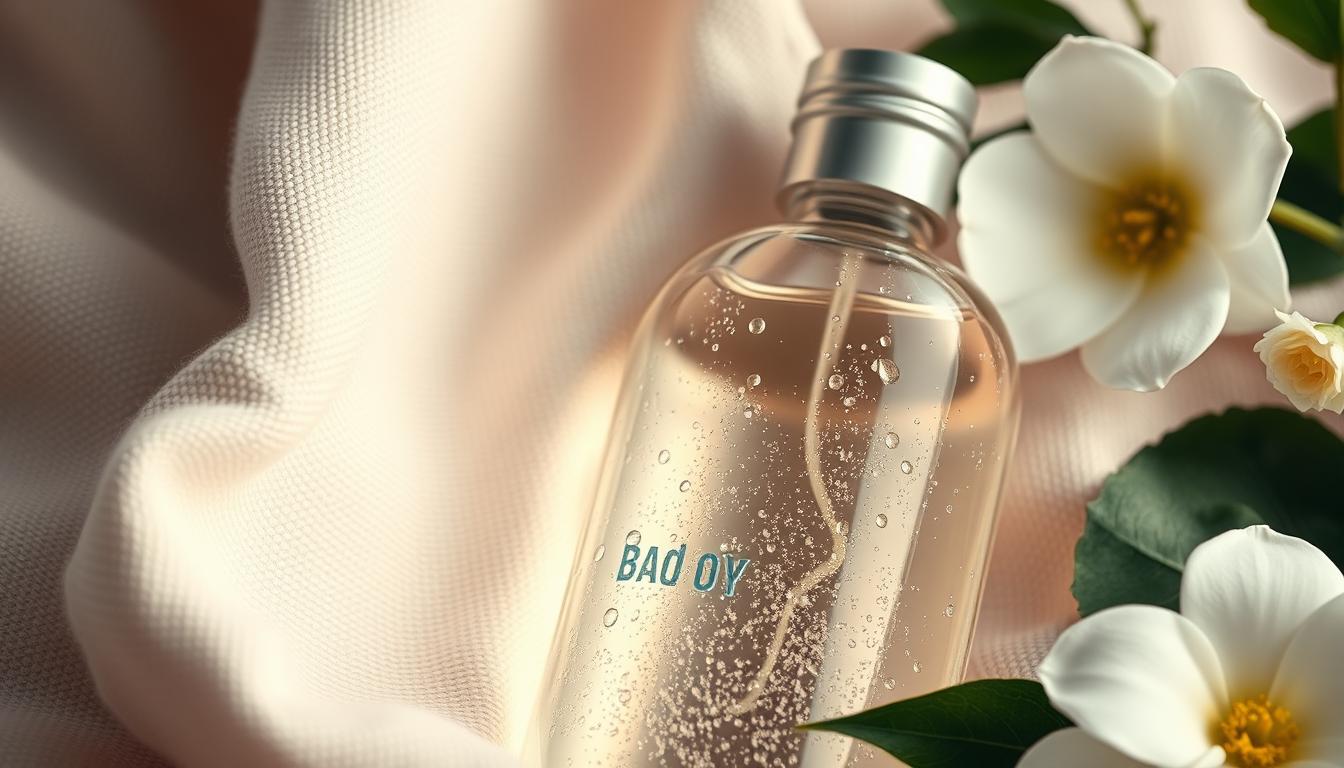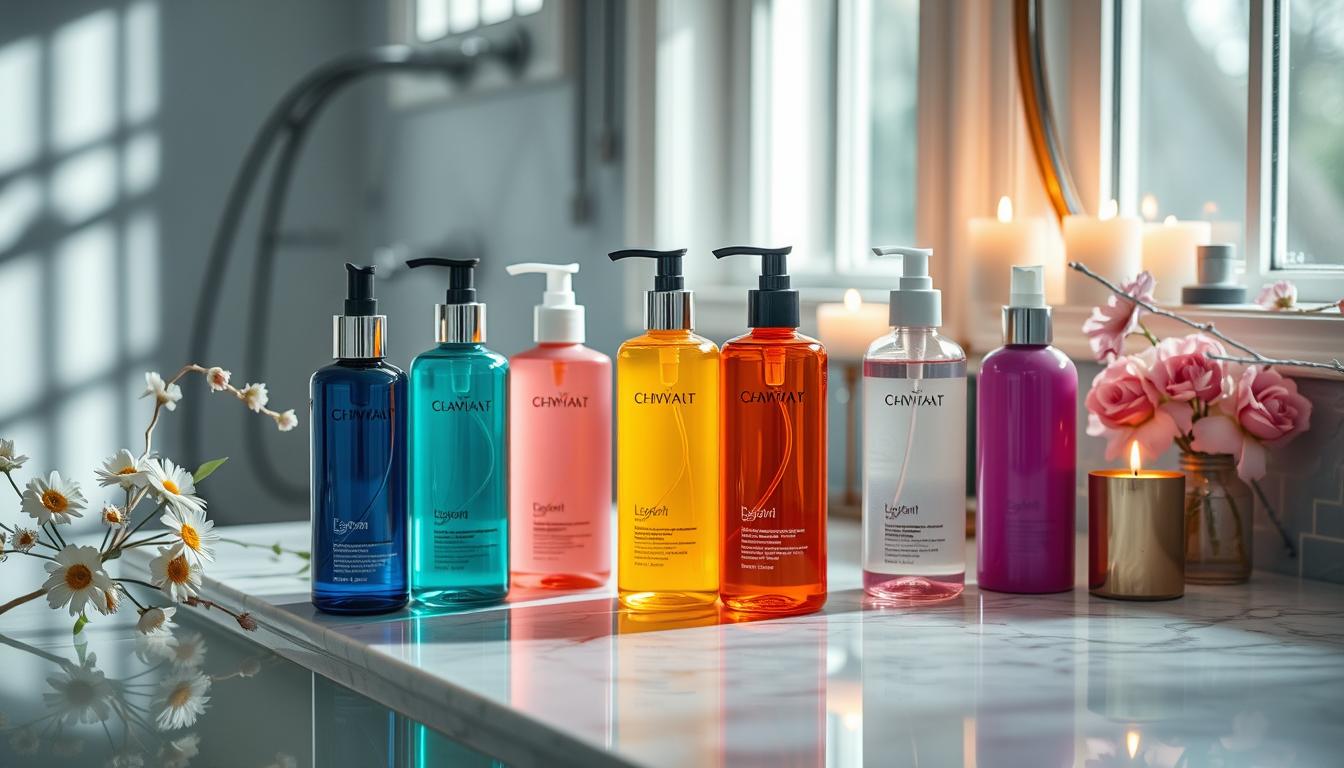Finding the right sexual lubricant can be tricky. You want your moments of intimacy to be both fun and safe. Sometimes, you might think of using baby oil as an easy solution. Many people have done the same, feeling a bit embarrassed about it. But is it really a good idea? Does baby oil make things better, or could it cause problems? We’ll look into baby oil as a lubricant, covering its uses, pros, and cons. We aim to guide you through finding the right balance between enjoyment and safety.
Key Takeaways
- Baby oil can weaken condoms by up to 90% in just one minute.
- Petroleum-based lubricants may increase the chance of infections.
- Water-based lubricants are better to use with condoms.
- Oil-based lubricants might cause irritation and allergies.
- Experts advise against using oil-based products with condoms.
- Many people choose specialized lubricants for better safety and performance.
Understanding Lubricants: What You Need to Know
Lubricants are key for improving sexual health by lowering friction during intimate times. There are different kinds, like water-based, silicone-based, and oil-based. Knowing about them can make your experience better.
Water-based lubricants are good with latex and non-latex condoms. This lowers the chance of condoms breaking. They are less likely to irritate but can dry out faster than others.
Silicone-based lubricants don’t dry out quickly and work with all condoms. They feel slippery and can make things more enjoyable for couples. But, they might not be safe for silicone toys.
Oil-based lubricants last long but have some issues. They can’t be used with latex condoms or dental dams. Though options like coconut oil are liked for being moisturizing, they could increase yeast infection risks.
Picking a safe lubricant is very important. You should avoid harmful ingredients that might cause problems. Stay away from products with chlorhexidine gluconate, propylene glycol, and fragrances. Plus, avoid anything with animal by-products or synthetic oils, like baby oil, as they may irritate sensitive spots.
Here is a table summarizing the different types of lubricants, their benefits, and potential safety concerns:
| Type of Lubricant | Benefits | Safety Concerns |
|---|---|---|
| Water-Based | Safe with all condoms; least irritating | Dries out quickly; may require reapplication |
| Silicone-Based | Long-lasting; safe with all condoms | Not compatible with silicone toys |
| Oil-Based | Long-lasting; moisturizing properties | Not safe with latex condoms; higher infection risk |
Lubricants can really improve your sexual health and enjoyment. Just make sure to choose carefully with safety and compatibility in mind.
What is Baby Oil and Its Uses?
Baby oil is made from mineral oil, a byproduct of petroleum. It is well-known for making skin soft. People use baby oil for more than just baby care. Its low cost and easy access make it popular for adult skin too.
Baby oil is great for keeping skin from getting dry. Using it regularly helps keep skin moist, especially in the cold when air is dry. It is best to use a small amount for massages to get good results.
Baby oil can also clean things well. Only a small amount is needed to clean shower doors. But, not everyone can use it. About 15% of people may find it clogs their pores, causing skin problems.
Also, baby oil’s use depends on the situation. It’s good for skin but think carefully about using it with other products. There could be risks.

| Application | Description | Benefits |
|---|---|---|
| Skincare | Moisturizing dry skin | Helps prevent dryness, especially in winter |
| Massage | Used for full-body massages | Improves relaxation and skin health |
| Cleaning | Removes sticky residues | Efficient at cleaning filmy surfaces |
| DIY Scrubs | Combination with salt for body scrubs | Exfoliates skin, enhancing texture |
Knowing these skincare applications shows baby oil’s many uses. This helps you use it wisely.
Can You Use Baby Oil for Sexual Lubrication?
Have you ever thought about using baby oil as a sexual lubricant? It might seem like a good idea, but there are risks. Baby oil, which comes from mineral oil, can cause irritation and problems during sex.
Baby oil is not water-soluble, making it hard to clean. This can increase the risk of bacterial problems. Women using baby oil have a higher chance of getting vaginal thrush.
Also, baby oil can weaken latex condoms by 90%. This raises the risk of them breaking. You could face unintended pregnancies or get sexually transmitted infections (STIs).
However, water-based lubricants are a better choice. They’re safe with condoms and better for intimate areas. Aloe vera gel is another safe option. It can help with dryness and discomfort without the risks of baby oil. Try these safer alternatives to improve your sexual experience and stay healthy.

| Type of Lubricant | Safety Rating | Compatibility with Condoms | Health Risks |
|---|---|---|---|
| Baby Oil | Low | No | High (risk of infections and STIs) |
| Water-Based | High | Yes | Minimal |
| Silicone-Based | Moderate | Depends (may dissolve condoms) | Moderate |
| Aloe Vera Gel | High | Yes | Minimal |
Is Baby Oil a Good Lubricant for Guys?
Thinking about using baby oil as a lubricant for men? You should know some important things first. It’s cheap and easy to find, but there are big safety and health issues you need to think about.
Safety Concerns with Baby Oil Usage
Baby oil and condoms don’t mix well. Studies show baby oil can break down latex very quickly. This can lead to unwanted pregnancies and the spread of STIs. If you use latex condoms, stay away from baby oil.
Potential Health Risks
Baby oil isn’t just bad for condom use. It could also up your risk for infections. For instance, women might get vaginal thrush from it. Products like Vaseline could also lead to bacterial vaginosis if used often. This is key to remember if you use baby oil a lot.
Also, baby oil can irritate your skin, especially the sensitive areas. Side effects might include discomfort for you and your partner. This can make intimate moments tougher. You should think about these risks with baby oil and consider safer options.

Common Alternatives to Baby Oil
Looking for alternatives to baby oil for intimate moments is important. The right lubricant ensures both safety and pleasure. Here are the top sexual lubricants to consider.
Water-Based Lubricants
Water-based lubricants are safe and versatile. They work well with condoms and sex toys. Many find these lubricants easy to clean and perfect for different activities.
However, they might need to be reapplied more often. Brands like Australian Bodycare are highly rated for reducing discomfort.
Silicone-Based Lubricants
Silicone-based lubricants provide a smoother experience. They last longer than water-based lubes, making them excellent for use. While safe with latex condoms, they can harm silicone toys. Many prefer this type for its durability.
Vegetable Oils
Some choose natural oils like coconut or olive for lubrication, but they can harm latex condoms and increase infection risks. These oils might also block pores and irritate the skin. Still, they are an option for activities without penetration, if carefully considered.
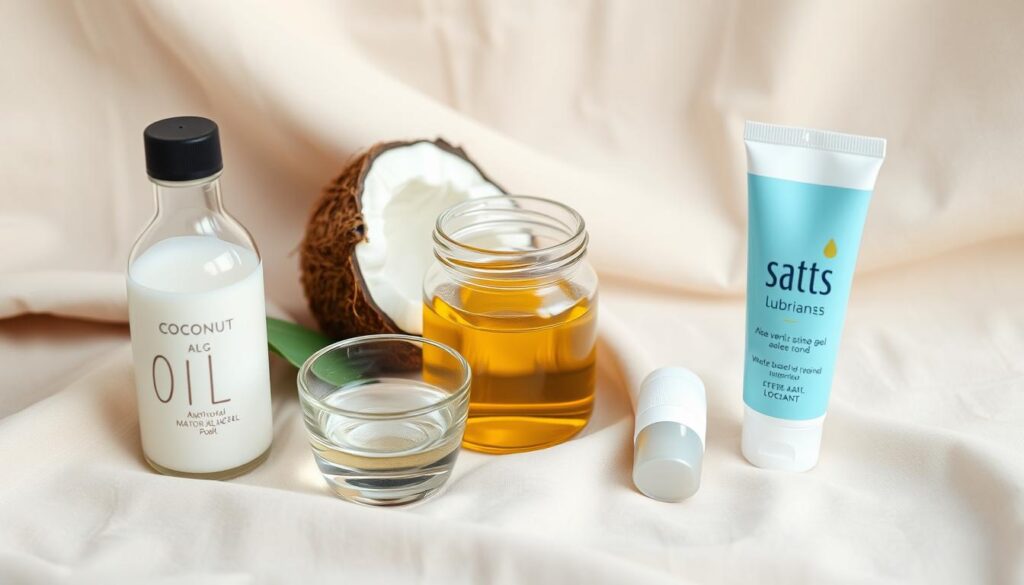
Understanding Condom Safety with Lubricants
When getting intimate, it’s vital to pair condoms with the right lubricants. This ensures safety against unwanted pregnancies and STIs. Yet, not all lubricants are safe for condoms. Their effectiveness might suffer depending on what you use.
Water-based lubricants are the best match for most condoms, like those made of latex. They reduce friction without harming the condom. But, using oil-based products, like baby oil, can be risky. One study found that mineral oil can weaken a condom by 90% in just 60 seconds, increasing the chance of it breaking.
In the US, condoms break less than 4% of the time. But, the breakage rate is higher elsewhere. For instance, it’s 4% in Kenya and Mali, and 13.3% in Ghana. Among MSM (men who have sex with men), using oil-based lubricants leads to a failure rate of 10.3%. This is much higher than the 1.7% failure rate with water-based ones.
To stay safe, here are some tips:
- Always choose water-based lubricants with latex condoms.
- Steer clear of oil-based options like baby oil, as they can damage the condom.
- Check the condom box for advice on which lubricants are safe to use with it.
Making the right choice in lubricants is key to effective condom use. It’s a big part of protecting your sexual health.
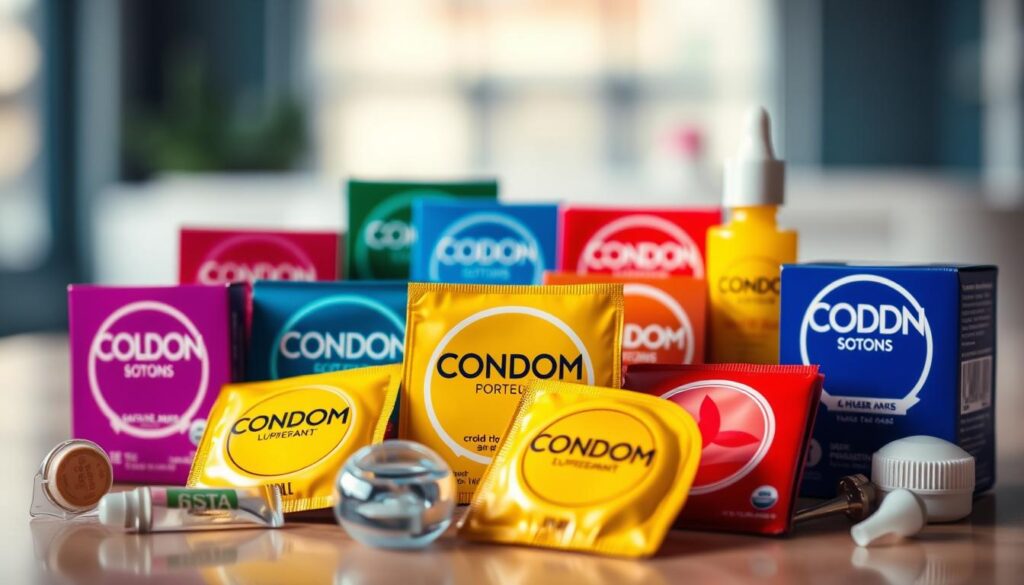
Effects of Baby Oil on Condoms and Diaphragms
Using baby oil as a lubricant can cause safety issues for condoms and diaphragms. Products like baby oil weaken latex, making breakage more likely during sex. This can raise the risk of unexpected pregnancy and spread of infections.
Research shows that baby oil damages the effectiveness of barrier protections. Latex condoms break down quickly when exposed to mineral oil lubricants. This puts users at a greater risk of catching or spreading infections.
Noteworthy findings reveal more about the risks of baby oil. In 2016, a study found a link between baby oil and more infections, especially in men who have sex with men. Using products like baby oil can also lead to bacterial vaginosis, harming one’s health.
It’s important to choose the right lubricant. Experts suggest using water or silicone-based lubricants instead of baby oil. These options are safer because they don’t impact pH levels or condom strength, keeping you protected.
| Lubricant Type | Compatibility with Condoms | Risk of Breakage | Health Risks |
|---|---|---|---|
| Baby Oil | Not Compatible | High | Increased infection risk |
| Petroleum Jelly | Not Compatible | High | Bacterial vaginosis |
| Water-Based Lubricant | Compatible | Low | Minimal health risks |
| Silicone-Based Lubricant | Compatible | Low | Minimal health risks |
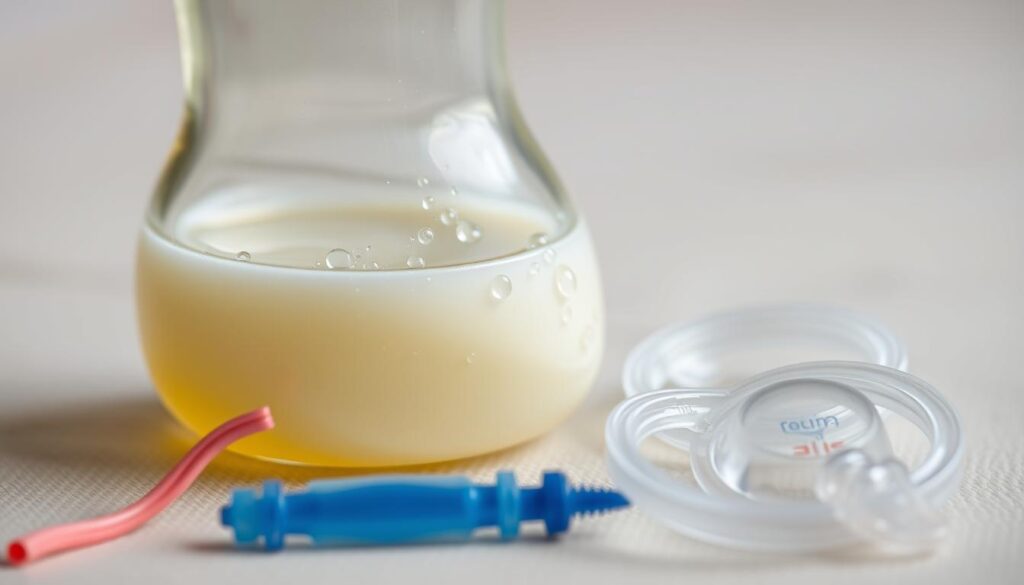
The Impact of Baby Oil on Skin
Baby oil might not be as safe as it seems. It can cause skin issues that need attention. This includes irritation and the chance of getting infections. Making an informed choice is essential for anyone’s skin care routine.
Skin Irritation Risks
Some people find baby oil irritates their skin. This is more common in sensitive spots, like the vulva or anus. Signs of this include:
- Itching
- Burning sensations
- Rashes
- Soreness
This irritation can really affect your comfort during close moments. Because baby oil is made from mineral oil, it’s hard to wash off. This can increase irritation risks.
Potential for Infections
Baby oil can also lead to infections. Since it’s not easy to wash off, cleaning well after using it is hard. Leftover oil can lead to unhealthy bacterial or yeast growth. This is especially a risk for women.
Instead of baby oil, try water-based lubes. They make up most of the lube market. They’re safe to use with condoms and toys, making them a better choice for intimate moments.
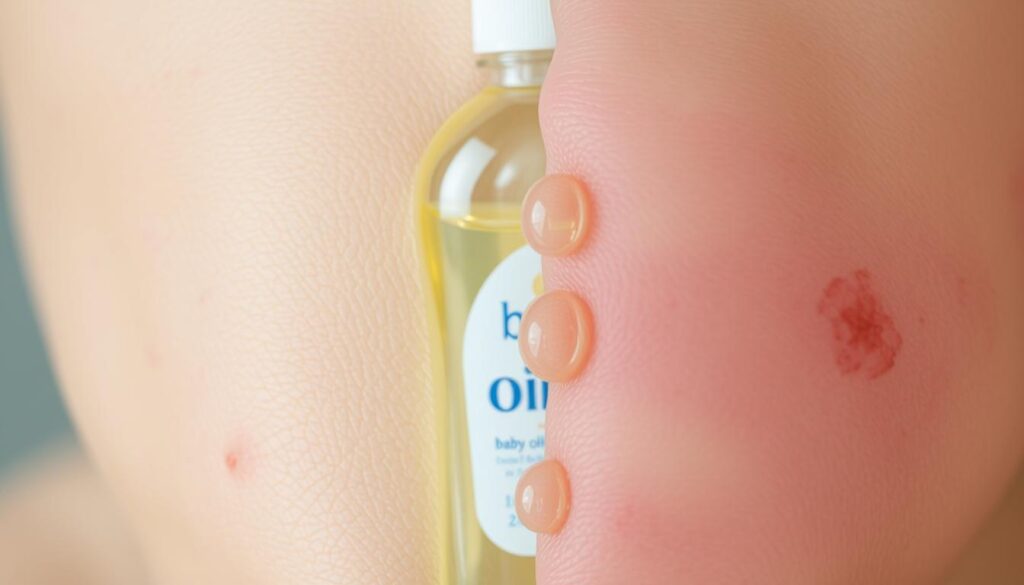
How to Choose the Right Lubricant for You
Choosing the right lubricant means understanding your body and what you plan to do. It’s important to find one that feels good and works with your activities. Think about the texture, how long it lasts, and if it’s safe with condoms or toys.
Assessing Personal Preferences
Selecting a lube is all about what you like. Here are some factors to keep in mind:
- Texture: Some people enjoy a thick, creamy feel, while others prefer something light.
- Longevity: Silicone-based lubes usually stay slippery longer than water-based ones.
- Compatibility: Make sure the lube won’t harm your toys or condoms.
Identifying Safe Products
It’s important to choose a safe lubricant. Look out for irritants in the ingredient list like:
- Glycerin
- Parabens
- Propylene glycol
Always go for lubes made for sexual activities. Knowing what’s safe helps keep you healthy. By staying informed, you’ll make better choices for a great experience.
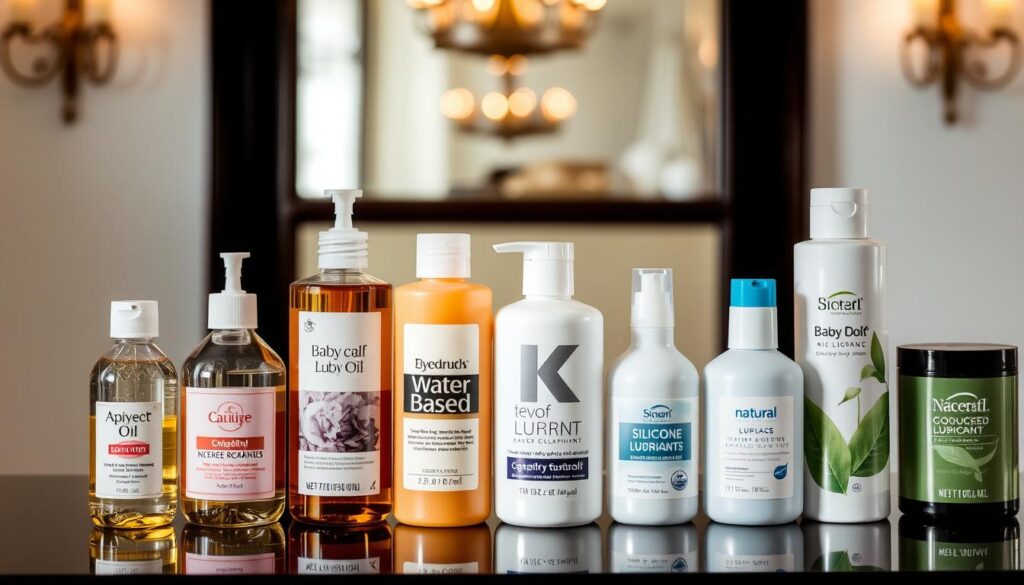
Expert Recommendations on Lubricant Use
Seeking advice from experts when choosing a lubricant is crucial. They recommend products made for intimate use. These items are safe and effective, making your experience better.
Talking about lube choices with your partner is essential. It boosts pleasure and helps you make smart choices. Talking to healthcare providers ensures the lube suits your health and likes.
Here’s a helpful comparison of common lubricant types:
| Type | Reapplication Frequency | Compatibility with Condoms | Additional Notes |
|---|---|---|---|
| Water-Based | Needs reapplication | Safe with latex and non-latex | Commonly used for all types of sex |
| Silicone-Based | Less frequent reapplication | Safe with non-latex | Long-lasting, ideal for anal sex |
| Oil-Based | May only need one application | Avoid with latex condoms | Can increase STI risks if used improperly |
Experts highlight the need for using FDA-approved lubes. The right lube improves sexual health and experience. Adding the right lubricant is key to enjoying intimacy together.

Conclusion
Baby oil may feel smooth but it’s not safe for sexual activities. Many Americans, especially those between 25 to 29, use lubricants. It’s key to choose ones that make sex better without harming your health.
Using baby oil can up the risk of infections and damage condoms. It’s smarter to pick lubricants made for sexual health. Research points out that lubricants can make sex more enjoyable, especially for women.
Safe sex is crucial for great intimate moments. Go for approved lubricants suited to your needs. The right lubricant enhances sex, offering more comfort and joy for everyone involved.

